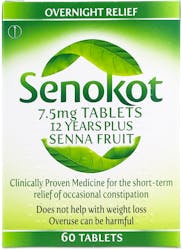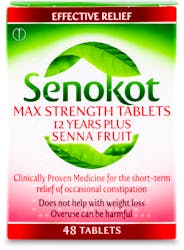Senokot Syrup 500ml
Senokot Syrup 500ml
What 500,000+ customers say about medino:
Description
Discover Senokot Syrup 500ml, a dependable laxative crafted to offer relief from sporadic constipation. Formulated with calcium sennosides (senna), sourced from the Senna plant leaves and fruit, Senokot Syrup aids in inducing bowel muscle movements. This action speeds up the passage of stools, alleviating constipation.
Key Features
- Delivers reliable relief from sporadic constipation
- Enriched with the herbal ingredient, calcium sennosides (senna)
- Induces bowel muscle movements to facilitate quicker stool passage
- Offers relief by the next day
- Enjoys a fruity base for an enjoyable taste
What symptoms or conditions can be treated with Senokot Syrup?
Senokot Syrup has been crafted to address sporadic constipation by inducing bowel muscle movements, which aid in faster stool transit.
What are the benefits of using Senokot Syrup?
Senokot Syrup stands out for its ability to alleviate sporadic constipation. It's enriched with the herbal element, senna, which takes effect by the next morning to deliver relief.
How does Senokot Syrup work?
The presence of calcium sennosides (senna) in Senokot Syrup induces bowel muscle movements. This accelerates stool transit, providing relief from constipation.
Are there any known side effects?
Senna might lead to symptoms like stomach discomfort, cramps, feelings of nausea, diarrhoea, or a sense of weakness. It's essential to get in touch with a healthcare expert if these symptoms persist or become more pronounced.
What does the research say about Senokot Syrup?
Two rigorous studies, which were placebo-controlled, highlighted improvements in constipation symptoms with senna use. This active component in Senokot Syrup showed superior results compared to the placebo regarding response rates, bowel movement frequency, constipation severity, and reduced straining sensation.
What are the main ingredients or components of Senokot Syrup?
Senokot Syrup's primary ingredient is calcium sennosides (senna), an herbal laxative, extracted from the Senna plant leaves and fruit.
Can I take Senokot Syrup if I'm pregnant or breastfeeding?
It's advised to have a conversation with your healthcare provider before opting for Senokot Syrup during pregnancy or while breastfeeding.
How long should I take Senokot Syrup?
It's not recommended to use Senokot Syrup beyond a week without discussing it with a physician.
Does Senokot Syrup help with weight loss?
Senokot Syrup and other laxatives don't influence calorie absorption from consumed food; hence, they don't assist in weight reduction.
Please read the patient information leaflet before starting the treatment.
Ingredients
Every 5 ml of the syrup has sennosides in the form of calcium salts, which equate to 7.5 mg of hydroxyanthracene glycosides, determined as sennoside B.
Read the patient leaflet for the full list of ingredients.
Usage and Instructions
Adults, the elderly and children over 12 years: one to two 5 ml spoonfuls at night.
Not to be used for more than 1 week. Usually, it is sufficient to take this medicinal product up to two to three times during that week.
If the symptoms persist during the use of the medicinal product, a doctor or a pharmacist should be consulted.
Warnings
Not to be used the same time as other laxative agents and in cases of intestinal obstructions and stenosis, atony, appendicitis, inflammatory colon diseases (e.g Crohn's disease, ulcerative colitis), abdominal pain of unknown origin, severe dehydration state with water and electrolyte depletion.
Consult a doctor or pharmacist if there's no bowel movement after three days.
Avoid prolonged use of stimulant laxatives. Extended use can harm intestine function and cause a laxative dependency. If daily laxatives are required, the root cause of constipation should be determined.
Only use this product if dietary changes or bulk-forming agents don't work.
This medicine contains maltitol liquid, unsuitable for those with rare fructose intolerance hereditary issues.
Each 5 ml of this syrup provides up to 3.2 kcal, which diabetics should consider.
Potential allergic reactions can be caused by the included methyl and propyl parahydroxybenzoate.
There's 6.9 mg of alcohol in every 5 ml of this medicine, equivalent to less than 1 ml of beer or wine, which won't cause noticeable effects.
Each 5ml has 0.09 mmol (or 3.51 mg) of potassium. Those with kidney issues or on potassium-restricted diets should be cautious.
Do not overdose.
Those taking specific medications, including cardiac glycosides and diuretics, or consuming liquorice root, should consult a doctor before using any senna leaf preparation.
Avoid using Senokot Syrup Pharmacy if experiencing undiagnosed gastrointestinal symptoms, such as stomach pain or nausea, as these could indicate a potential intestinal blockage.
Long-term use can lead to an ineffective colon. Overuse may cause imbalances in fluid and electrolytes and result in hypokalaemia.
Dehydration symptoms, including thirst and reduced urine output, may arise from fluid loss. Especially in specific groups like the elderly or those with kidney issues, stopping the syrup and resuming under medical guidance is advised.
Kidney disorder patients should be cautious of potential electrolyte imbalances.
For incontinent adults using senna leaf products, frequent pad changes are recommended to reduce prolonged faecal skin contact.
Stimulant laxatives, including Senokot Syrup Pharmacy, aren't for weight loss. They don't decrease calorie or nutrient absorption but can cause diarrhoea, abdominal pain, and dehydration.
Consult a doctor or pharmacist if symptoms worsen while using the medicine.
Side Effects
| System Organ Class | Frequency | Adverse Events |
|---|---|---|
| Immune System Disorders | Not known | Hypersensitivity, urticaria, asthma, hypogammaglobulinaemia |
| Metabolism and Nutrition Disorders | Not known | Hypokalaemia1, cachexia |
| Gastrointestinal Disorders | Not known | Abdominal pain, abdominal spasm, diarrhoea2, gastrointestinal tract mucosal pigmentation3 |
| Skin and Subcutaneous Tissue Disorders | Not known | Pruritus, local or generalised exanthema |
| Musculoskeletal and Connective Tissue Disorders | Not known | Finger clubbing, tetany and hypertrophic osteoarthropathy |
| Renal and Urinary Disorders | Not known | Chromaturia4 |







